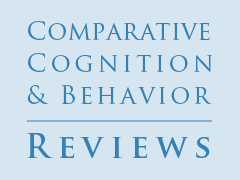Concept Learning in Animals
by Thomas R. Zentall,
University of Kentucky
Edward A. Wasserman,
University of Iowa
Olga F. Lazareva,
University of Iowa
Roger K. R. Thompson,
Franklin & Marshall College
Mary Jo Rattermann,
University of Indianapolis
Reading Options:
Download/Read PDF | Add to Endnote
Abstract
Generally speaking, the study of concepts in cognitive psychology is anthropocentric with respect to both content and theory. A broader comparative perspective on the various forms of concept learning not only provides a more inclusive view of conceptual behavior, but it also provides a more objective perspective from which to identify underlying processes. We suggest that several of the major varieties of conceptual classes claimed to be uniquely human are also exhibited by nonhuman animals. We present evidence for the formation of several sorts of conceptual stimulus classes by nonhuman animals: perceptual classes involving classification according to the shared attributes of objects, associative classes or functional equivalences in which stimuli form a class based on common associations, relational classes, in which the conceptual relationship between or among stimuli defines the class, and relations between relations, in which the conceptual (analogical) relationship is defined by the relation between classes of stimuli. We conclude that not only are nonhuman animals capable of acquiring a wide variety of concepts, but that the underlying processes that determine concept learning are also likely to be quite similar.
Keywords: concept learning, perceptual classes, associative classes, relational classes, analogical relations
Zentall, T. R., Wasserman, E. A., Lazareva, O. F., Thompson, R. R. K., & Ratterman, M. J. (2008). Concept Learning in Animals. Comparative Cognition & Behavior Reviews, 3, 13-45. Retrieved from https://comparative-cognition-and-behavior-reviews.org/ doi:10.3819/ccbr.2008.30002
